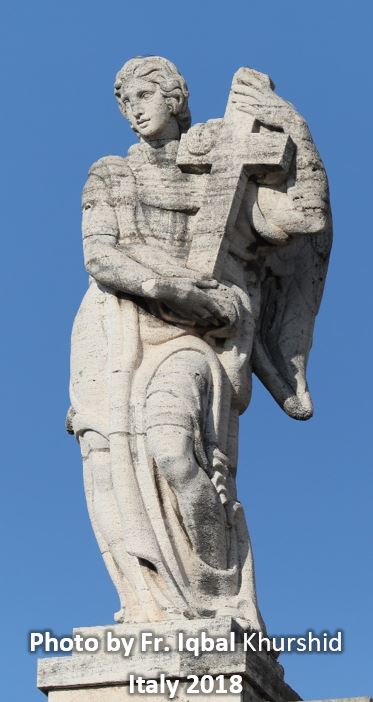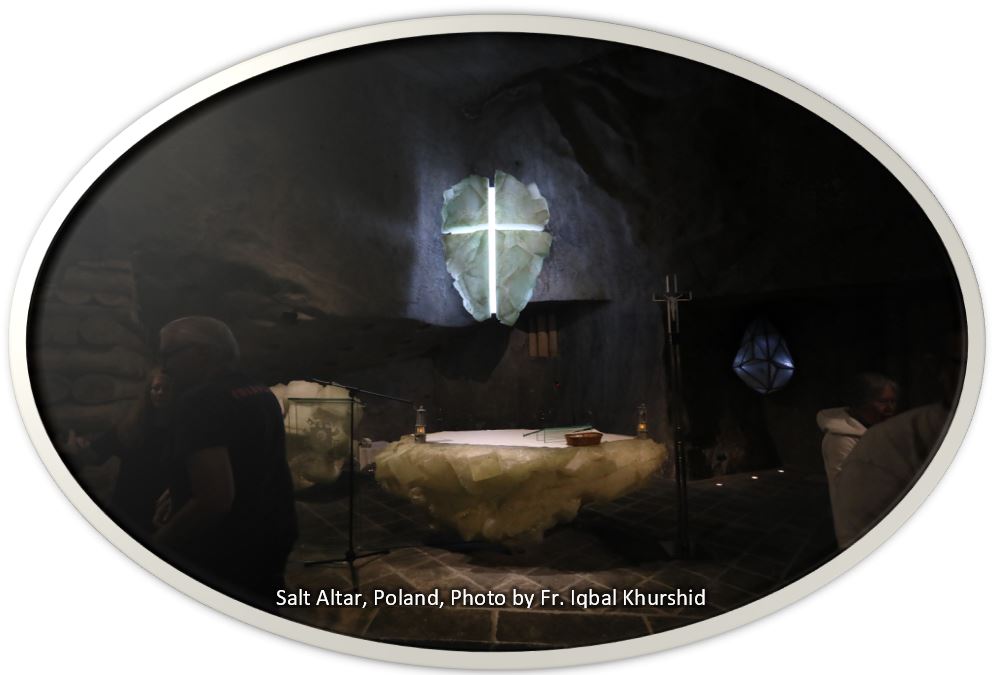
6th Sunday in Ordinary Time Year C – February 13, 2022
BLESSING OF TRUST
For the last two Sundays we have been reflecting on the calling of Prophets Jeremiah and Isaiah and how God stood for them to protect against the evil. Of course, on the other hand the Gospel Readings invited us not only to reflect on the element of rejection which Jesus faced by his own people but also, we reflected on the unworthiness of St. Peter. Did the story of St. Peter end there, absolutely not, but his title and job were changed from “Fisherman” to “Fisher of Men”. Do we glorify the Lord through our work?
I believe that this Sunday’s Sacred Scripture readings so powerfully remind us of how blessed we are with the gift of trust. According to Saint Ephrem, we must trust in the Word of God which helps us to learn how to trust in the Lord and believe that through his divine providence we are going to receive what we need: “Lord, who can comprehend even one of your words? We lose more of it than we grasp, like those who drink from a living spring. For God’s word offers different facets according to the capacity of the listener, and the Lord has portrayed his message in many colors, so that whoever gazes upon it can see in it what suits him. Within it he has buried many treasures, so that each of us might grow rich in seeking them out. The word of God is a tree of life that offers us blessed fruit from each of its branches. It is like that rock, which was struck open in the wilderness, from which all were offered spiritual drink. As the Apostle says: They ate spiritual food, and they drank spiritual drink. And so, whenever anyone discovers some part of the treasure, he should not think that he has exhausted God’s word. Instead, he should feel that this is all that he was able to find of the wealth contained in it. Nor should he say that the word is weak and sterile or look down on it simply because this portion was all that he happened to find. But precisely because he could not capture it all he should give thanks for its riches”.
He continues to say “Be glad then that you are overwhelmed, and do not be saddened because he has overcome you. A thirsty man is happy when he is drinking, and he is not depressed because he cannot exhaust the spring. So let this spring quench your thirst, and not your thirst the spring. For if you can satisfy your thirst without exhausting the spring, then when you thirst again you can drink from it once more; but if when your thirst is sated the spring is also dried up, then your victory would turn to your own harm”.( Please do read Psalm 1, 119 & Revelation 22)
Furthermore as he reflects on the importance of Word of God, he invites us to “Be thankful then for what you have received, and do not be saddened at all that such an abundance still remains. What you have received and attained is your present share, while what is left will be your heritage. For what you could not take at one time because of your weakness, you will be able to grasp at another if you only persevere. So do not foolishly try to drain in one draught what cannot be consumed all at once, and do not cease out of faintheartedness from what you will be able to absorb as time goes on” (Please read Luke 1:45-57)
Wishing to encourage her young son’s progress on the piano, a mother took her boy to a Paderewski concert. After they were seated, the mother spotted a friend in the audience and walked down the aisle to greet her. Seizing the opportunity to explore the wonders of the concert hall, the little boy rose and eventually explored his way through a door marked “NO ADMITTANCE.”
When the house lights dimmed and the concert was about to begin, the mother returned to her seat and discovered that the child was missing.
Suddenly, the curtains parted, and spotlights focused on the impressive Steinway on stage. In horror, the mother saw her little boy was sitting at the keyboard, innocently picking out “Twinkle, Twinkle Little Star.” At that moment, the great piano master made his entrance, quickly moved to the piano, and whispered in the boy’s ear, “Don’t quit. Keep playing.”
Then, leaning over, Paderewski reached down with his left hand and began filling in a bass part. Soon, his right arm reached around to the other side of the child, and he added a running obligato. Together, the old master and the young novice transformed a frightening situation into a wonderfully creative experience. The audience was so mesmerized that they couldn’t recall what else the great master played – only the classic “Twinkle, Twinkle Little Star.”
That’s the way it is with God. What we can accomplish on our own is hardly noteworthy. We try our best, but the results aren’t exactly graceful flowing music. However, with the hand of the Master, our life’s work truly can be beautiful. Next time you set out to accomplish great feats, listen carefully. You can hear the voice of the Master, whispering in your ear, “Don’t quit. Keep playing.”
Feel His loving arms around you. Know that His strong hands are there helping you turn your feeble attempts into true masterpieces. God doesn’t call the equipped; He equips the called, and He’ll always be there to love and guide you on to great things.
That is the exact message we see today that once we trust in the Lord, he not only blesses with every blessing we need but also, he makes us fruitful to bear everlasting fruit of his love and compassion. He holds us in the palms of his hands as he has written our names on them because in our misery he says “I have heard the cry of my people and have come down to save them”
The First Reading from Jeremiah reads: “Cursed is the man who trusts in man and makes flesh his arm, whose heart turns away from the Lord”. This is the profile of the worldliness we saw in people who are arrogant, proud, and self-righteous. And how will these people end up? Scripture defines them as “a shrub in the desert and shall not see any good come. He shall dwell in the parched places of the wilderness” — his soul is a desert — “an uninhabited salt land”. And all of this because, in truth, the worldly are alone with their selfishness. What do we need to learn from the first part of the Reading is “without God, we are nothing”? It’s no easy to thing to have perfect trust in God. Even when we know intellectually that he loves us and will provide for our needs, it can be hard to live like we truly believe he will take care of us. When we look to the saints, most of them probably came a lot closer to truly trusting in God than we do. So, it should be no surprise that many of the saints had a bit to say about trusting God and living like we know he will take care of us. It can be easy to fall into the trap of feeling like we must find a way to solve all the difficulties in our lives by ourselves. But the saints have some things to say about letting go of our worries and anxiety in favor of trusting God.
Here is a story by an unknown author, for us to understand that once we trust in the Lord then we leave all our worries on to him “who cares for us” as “he has carried all our iniquities on to him”.
She hired a plumber to help her restore an old farmhouse, and he had just finished a rough first day on the job: a flat tire made him lose an hour of work, his electric drill quit, and his ancient one-ton truck refused to start. While she drove him home, he sat in stony silence. On arriving, he invited her in to meet his family. As they walked toward the front door, he paused briefly at a small tree, touching the tips of the branches with both hands. When opening the door, he underwent an amazing transformation. His tanned face was wreathed in smiles, and he hugged his two small children and gave his wife a kiss.
Afterward, he walked back to the car. They passed the tree, and her curiosity got the better of her. She asked him about what she had seen him do earlier. “Oh, that’s my trouble tree,” he replied. “I know I can’t help having troubles on the job, but one thing’s for sure; those troubles don’t belong in the house with my wife and the children. So, I just hang them up on the tree every night when I come home and ask God to take care of them. Then in the morning, I pick them up again. Funny thing is,” he smiled, “when I come out in the morning to pick ’em up, there aren’t nearly as many as I remember hanging up the night before.”
Times of emotional, mental, or physical sufferings are perhaps some of the most difficult times for us to trust in God. Here are some of our favorite quotes from several different saints on trusting in God and his providence in our lives.
We must often feel weary and tired, yet God brings us through all these things.” Saint Mary MacKillop
“If God sends you many sufferings it is a sign that He has great plans for you, and certainly wants to make you a saint.” Saint Ignatius of Loyola
“Do not fear what may happen tomorrow. The same loving Father who cares for you today will care for you tomorrow and every day. Either He will shield you from suffering, or He will give you unfailing strength to bear it. Be at peace, then, and put aside all anxious thoughts and imaginings.” Saint Francis de Sales
“Lay all your cares about the future trustingly in God’s hands and let yourself be guided by the Lord just like a little child.” Saint Edith Stein
I see that God never tries us beyond what we can suffer. Oh, I fear nothing; if God sends such great sufferings to a soul, He upholds it with an even greater grace, though we are not aware of it. One act of trust in such moments gives greater glory to God than whole hours passed in prayer filled with consolation.” Saint Faustina
In the second part of the Reading, people who trust in the Lord are compared with tree planted near the streams of water: “Blessed is the man who trusts in the Lord, whose trust is the Lord. He is like a tree planted by water”, while the other “was like a shrub in the desert”. This, then, is the final judgement: nothing is more treacherous for a heart and difficult to heal: that man had a sick heart, so battered by this worldly lifestyle that it was very difficult to heal. According to Saint Alphonsus Liguori “Those whose hearts are enlarged by confidence in God run swiftly on the path of perfection. They not only run, but they also fly; because, having placed all their hope in the Lord, they are no longer weak as they once were. They become strong with the strength of God, which is given to all who put their trust in Him.” Do we trust in the Lord?
Holy Father reflecting on the Gospel says “Today’s Gospel presents us Saint Luke’s passage on the Beatitudes (which is bit different than St. Matthew 5:1-12). The text is arranged into four beatitudes and four admonitions denoted by the expression, “woe to you”. With these assertive and sharp words, Jesus opens our eyes and lets us look with his gaze, beyond appearances, beyond the surface and teaches us to discern situations with faith.
Jesus proclaims the poor, the hungry, the suffering and the persecuted blessed, and he admonishes those who are rich, satisfied, who laugh and are praised by the people. The reason behind this paradoxical beatitude lies in the fact that God is close to those who suffer and intercedes to free them from their bondage. Jesus sees this; he already sees the beatitude beyond its negative reality. And likewise, the “woe to you” addressed to those who are doing well today, has the purpose of “waking” them from the dangerous deceit of egotism, and opening them up to the logic of love, while they still have the time to do so”.
The page from today’s Gospel thus invites us to reflect on the profound sense of having faith, which consists in our trusting completely in the Lord. It is about demolishing worldly idols in order to open our hearts to the true and living God. (Please read 1 Peter 5:1-14). He alone can give our life that fullness so deeply desired and yet difficult to attain. Indeed, there are many in our day too who profess to be dispensers of happiness: they come and promise us swift success, great profits within our reach, magical solutions to every problem and so on.
Therefore, Jesus opens our eyes to reality. We are called to happiness, to be blessed, and we become so as of now, to the measure in which we place ourselves on the side of God, of his Kingdom, on the side of what is not momentary but rather endures for eternal life. We are happy if we acknowledge we are needy before God — and this is very important: “Lord, I need you” — and if, like him and with him, we are close to the poor, the suffering and the hungry. We too are like this before God: we are poor, suffering, we are hungry before God. Although we possess worldly goods, we experience joy when we do not idolize or sell our souls out to them but are able to share them with our brothers and sisters. Today the liturgy invites us once again to question ourselves about this and to be truthful in our heart. (Please read Matthew 25)
Jesus’ Beatitudes are a decisive message which urges us not to place our trust in material and fleeting things, not to seek happiness by following smoke vendors — who are often vendors of death — experts in illusion. We should not follow them because they are unable to give us hope. May the Lord help us open our eyes to acquire a more penetrating view of reality, to heal the chronic short-sightedness with which the worldly spirit infects us. What is our attitude toward Beatitudes today? Do we trust in the Lord and proclaim like Blessed Virgin Mary “Behold I am the handmaid of the Lord, let it be done to me according to your Word”?
Other Sermons In This Series

4th Sunday in Ordinary Time Year C – January 30, 2022
January 28, 2022

30th Sunday in Ordinary Time Year C ~ October 23, 2022
October 21, 2022

REFLECTION FOR ALL SUNDAYS YEAR B ~ AUGUST 2024
July 30, 2024

